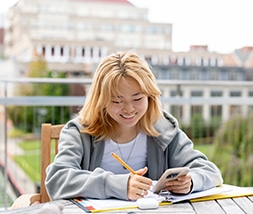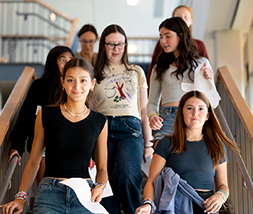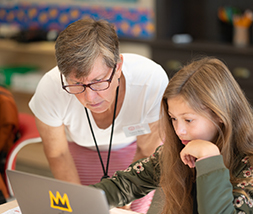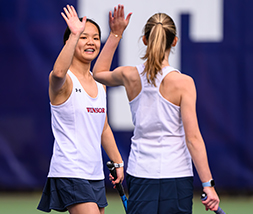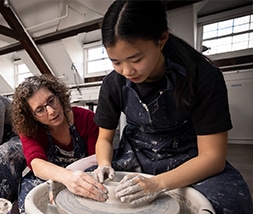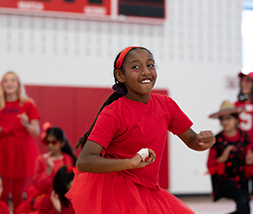Bridging Divides
As everyone seems to be fond of saying, these are complicated times, and there is apprehension and anxiety in the air. As you read that first sentence, you might have been imagining several situations that apply for you—an upcoming transition, or event, or conversation. When I was in college, my favorite classes involved debate and difficult topics (from Russian Politics to Literature of the Holocaust to a survey of literary theory), and we openly did intellectual battle with one another at such a pitch that the conversations would sometimes spill out of the classroom and into the dining hall or back to the dorms. I had such strong opinions, and I had so much to learn.
Things are different these days, and most people are reluctant to say what they think, especially when they think others might not share their opinion. This is true of students, but it is also true of adults. There is a real social risk, it seems, in saying what you think, listening to others, revising your perspective, and trying again.
Which is why the Winsor professional community’s summer reading was so very helpful. I Never Thought of It That Way by Mónica Guzmán* is—above all—very readable. It is full of fun anecdotes and examples that are poignant but not threatening. Acronyms abound, mostly about tricks for being in conversation with someone whose background and perspective might be very different from yours. The book title itself has an acronym, INTOIT (into it), and is a guide to the aha moment she hopes we will repeatedly have with others when we talk to them about their beliefs and experiences. Guzmán essentially teaches the reader how to have a real conversation with someone else. It is surely useful for talking with someone holding very different political views, but it is also useful for talking with friends. Because it is a way to learn what they might not think it’s safe to say—and a way, thereby, to grow stronger in your relationship with them.
Last week, the Winsor professional community came together to discuss the book, to identify aspects of her suggestions that were helpful, and ones that seemed especially hard—personally or in our work with colleagues and students. It was a thoughtful, kind, joyful conversation, full of the hope that always lives in schools, the search for a newer and better way of teaching and supporting students, and the eagerness to know one another even better than we do.
But as I have gone online to find follow-ups or responses to the book, I have found more angry rants about how wrong she is than anything else. And all I can think is: don’t live that way. Don’t let anger drive your responses or your approach to others. Perhaps it’s cringey (as the students often accuse me of being), but we have to lead with love.
Which brings me to Dr. Valda Harris Montgomery, who was our honored speaker at assembly 10 days ago, in conversation with her friend and colleague Professor Shakita Brooks Jones. This was our annual assembly to which we invite students from Boston Latin School to join us and, in this case, stay for conversation with Dr. Montgomery afterwards. As Julian Braxton wrote to the community in announcing the assembly, Dr. Montgomery was a teenager “during some of the most turbulent times of the civil rights movement. She witnessed the Freedom Riders, and a bloodied and beaten John Lewis [found refuge] in her kitchen late at night… Her family’s home became a safe haven and gathering spot for prominent leaders like Dr. Martin Luther King Jr., Rev. Ralph D. Abernathy, Diane Nash, James Farmer, and others.” Dr. Montgomery talked about her non-violence training; about the stops and starts of the civil rights movement; about her neighbor Dr. Martin Luther King Jr., whom she thought of as “Uncle Martin;” and above all about the ongoing fight for equity and justice.
At the end of the assembly, I offered Class I students the opportunity to come up on stage to meet Dr. Montgomery, and some of the students were so excited that they gasped. And then they poured onto the stage to shake her hand, share that she was just like their grandmother, and take a photo with her. They were starstruck.
After the assembly, some Winsor and Boston Latin students were able to return to the theater and ask questions of both Dr. Montgomery and Professor Jones; many of those questions were about the students’ experiences with racism and inequity and their frustration at feeling impotent to affect change. Dr. Montgomery and Professor Jones offered anecdotes, advice, and empathy. And they made two central points over and over:
- “Don’t leave the conversation.” Stay in the discussion, in the fight for what you think is right, no matter what or who is pushing against you. Make sure your voice is part of the conversation.
- “When you feel anger, don’t lose that, but turn it into passion.” Don’t fight with anger, and don’t let anger dominate you. Fight for change with love and with passion.
They encouraged the students to look back a generation or two, and work to make things better every day, always with an eye toward the past as well as hope for the future. Their conversation was absolutely saturated with love and compassion, and with commitment to every single student listening to them.
Later this month students will have another special opportunity to practice these important skills during our Community Curriculum Day on October 29. A longstanding Winsor tradition, this year’s theme is Winsor Wildcats in Action: Civic Engagement and Bridging Divides, and will feature student-led workshops, guest speakers, and political leaders who will engage with our students throughout the day.
It can be a long road toward understanding and genuine love and respect for all other people, and a lifetime trying to achieve such goals. Every day, we have the chance to take a few more steps in that direction, to stay in the conversation, to turn our anger into passion. We don’t always succeed every day. But there is hardly any goal more worthy.
Warmly,
Sarah Pelmas
Head of School
O’Donnell Family Chair
*Whether or not you have a chance to read the book, I hope you will join us for a community-wide webinar featuring a panel discussion on civic discourse with Mónica Guzmán on Monday, October 28 from 7:00 to 8:00 p.m. You’re welcome to register here.
